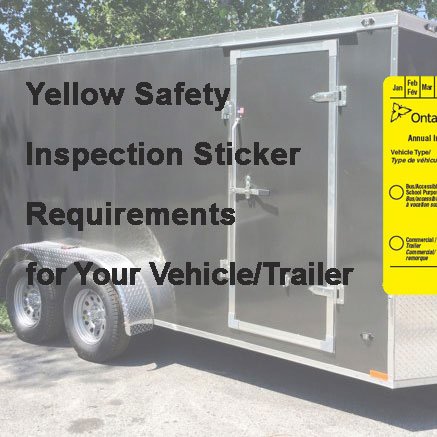
The Ministry of Transportation of Ontario (MTO) requires periodic safety inspections under the Highway Traffic Act. Typically done at an MTO authorized Motor Vehicle Inspection Station, you will be issued a Yellow Safety Inspection Sticker when your vehicle/trailer passes the safety inspection, and this yellow sticker must be affixed to your vehicle/trailer.
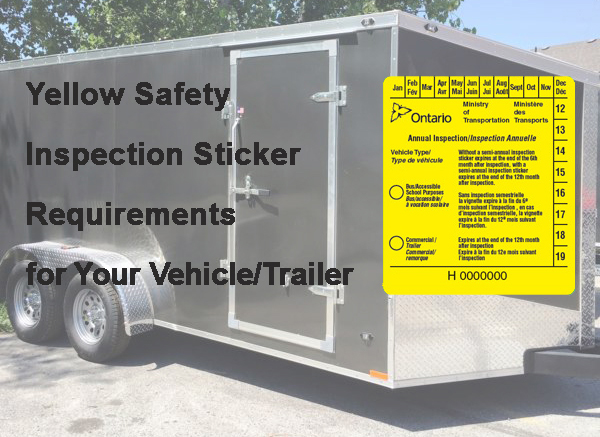
So who is required to have a yellow sticker which is granted upon passing the Annual Inspection and Safety Certificate (SSC)?
Let’s begin by understanding the three different weights that is part of the criteria to determines if you require an annual safety test.
Now that we understand how to determine the different weights, let’s outline who requires the sticker. In the past, the “Yellow Annual Safety Inspection Sticker” applied to vehicles used for either commercial or personal functions. However, effective July 1, 2019, the Ontario’s Regulatory Registry amended the Act, so vehicles towing for personal use are now exempt from the requirement for an annual inspection. In addition, while the Highway Traffic Act considers all pickup trucks to be commercial motor vehicles, with the revised Act, it exempts pickup trucks and trailers for personal use from the annual inspection and displaying of the yellow sticker.
Definition of Pick Up Trucks:
For the purpose of this Act, pickup trucks are defined as a vehicle that meets both of the following requirements:
If you have a pickup truck (as defined above) or pickup truck and trailer combination, and is solely using the vehicle for personal purposes without compensation and will not be carrying commercial cargo, tools or equipment of a type normally used for commercial purposes, then you will be exempted from the annual inspection.
So for those who uses their vehicle for commercial purposes OR transport items (commercial cargo, tools, equipment etc.) used for commercial purposes and meets the following conditions (see below) a yellow sticker is required.
or
An annual inspection is valid for 12 months and must be renewed prior to expiring to avoid hefty fines. The inspection is put in place to make sure each vehicle is in safe condition to be operated which help reduce collisions caused by mechanical defects. The following components are thoroughly inspected to check that they comply with the National Safety Standard and applicable legislation:
If you own a vehicle and/or trailer in Ontario which fit the descriptions above and don’t have the Yellow Annual Safety Inspection Sticker, immediately have your vehicle/trailer inspected by an authorized “Motor Vehicle Inspection Station” like First PlaceTrailer to avoid potential fines. Fix and repair any items that do not comply to current safety standards. Once your vehicle/trailer has passed the inspection, affix the Yellow Annual Safety Inspection Sticker to the vehicle/trailer and have a copy of the certificate of inspection with you.
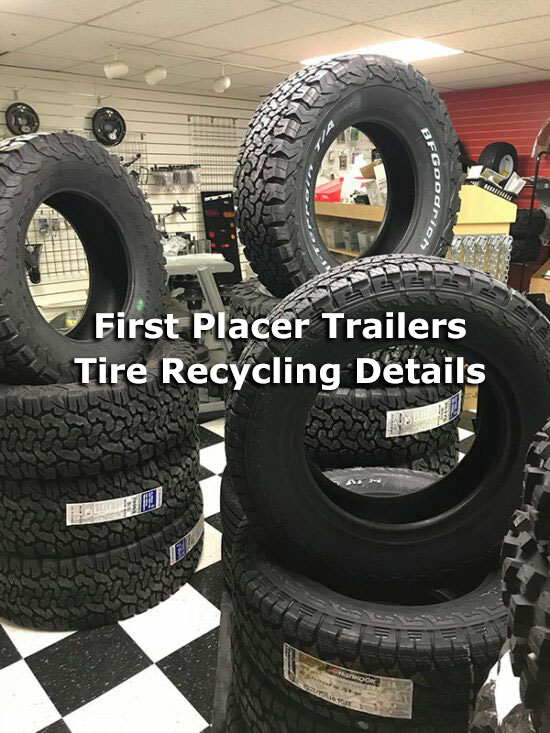
 FIRST PLACE TRAILERS TIRE RECYCLING PROGRAM
FIRST PLACE TRAILERS TIRE RECYCLING PROGRAMAs of January 1, 2019, the Resource Recovery and Circular Economy Act, 2016 (Ontario Regulation 225/18), places certain responsibilities directly on individual producers – tire manufacturers, equipment manufacturers and importers. As an importer of trailers and individual tires into Ontario, First Place Trailers is considered a producer.
In compliance with Section 12 of the Act, below are the details of our promotion and education program:
Tire Recycling Fee
To recover the cost of collecting and recycling tires, First Place Trailers is authorized to charge a Tire Recycling Fee. The fee details are outlined on the invoice provided when this fee has been applied.
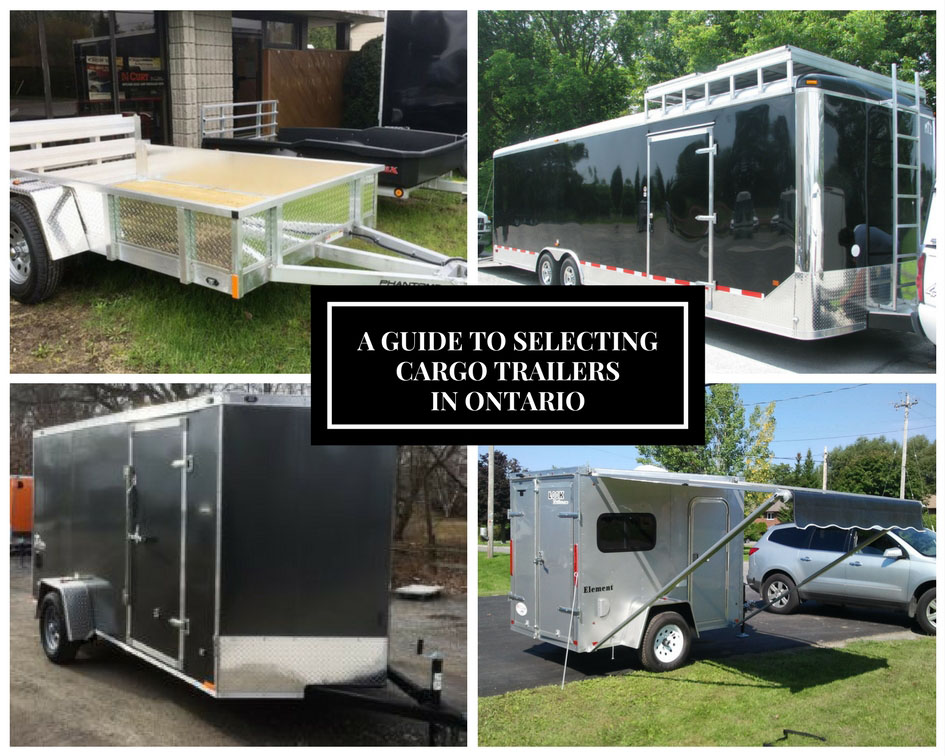

There are numerous reasons someone will consider buying a cargo trailer. From hauling kayaks to the cottage a few times during the summer or towing your snowmobile or motorcycle to the track or renovation contractors using it day in day out towing heavy construction material, there is an ideal trailer for every purpose.
There are many types of trailers available on the market. You have the option of buying enclosed cargo trailers or open trailers. You can buy off-the-shelf stock trailers, and you can also customize most trailers to meet your needs. With so many styles, sizes and options to choose from, the goal of this article is to help you figure out how to pick the right trailer to suit your needs.
How to Choose the Best Trailer for Your Needs
To help you choose the right type of cargo and utility trailer, a knowledgeable trailer salesperson will ask you these questions to determine the ideal trailer for your needs:
Single vs Tandem Axles
Axles are the set of wheels on the trailer. A single axle trailer has a sole set of wheels and a tandem axle has two sets of wheels. To determine if you need a single axle or a tandem axle, it boils down to the cargo weight, maneuverability and type of terrain. In general, single axle can hold less weight but has better maneuverability whereas tandem axle can haul heavier loads and can perform better on uneven terrains.
Single axle trailers typically have a Gross Vehicle Weight (GVW) rating of 3500 lbs, including brakes. This means that the trailer and all the stuff you put in it can not weigh more than 3500 lbs.
Tandem axle trailers can carry twice as much as a single axle, making the GVW for tandem axles at 7000 lbs. Therefore, if the tandem axle trailer weighs 2000 lbs and has a GVW rating of 7000 lbs, then you can put 5000 lb worth of items on it.
Size of Trailer
Obviously, you want to buy the trailer that will fit the contents you plan to tow. Trailers come in all sizes, with the smallest enclosed trailer footprint being 4×6 ft. In general, our recommendation is to buy the size that is the best fit for the item(s) you plan to tow regularly. For the occasional bigger item, we have trailers available for rent at our Brighton location.
Enclosed vs Open Trailer
Enclosed trailers are great for high-valued items such as our vintage automobile or souped up motorbike – it keeps your content out-of-sight and protected from the elements. However, enclosed trailer requires a higher towing capacity vehicle compared to open trailers, and creates more drag so is less fuel efficient.
Consider Custom Trailers
Even with the wide range of trailer styles and sizes available, many consumers may not find the right trailer that meets their needs. The good news is that any trailer is customizable — if you can dream it, we can build it!. Instead of just having side doors, you can add ramp doors or barn doors. You can increase the height of the trailer or add windows, if you wish.
Contact us for all your trailer needs
We’re here to answer any questions you may have about which trailer is best for your needs. Contact us via phone of email, or pass by our shop in Brighton, Ontario.
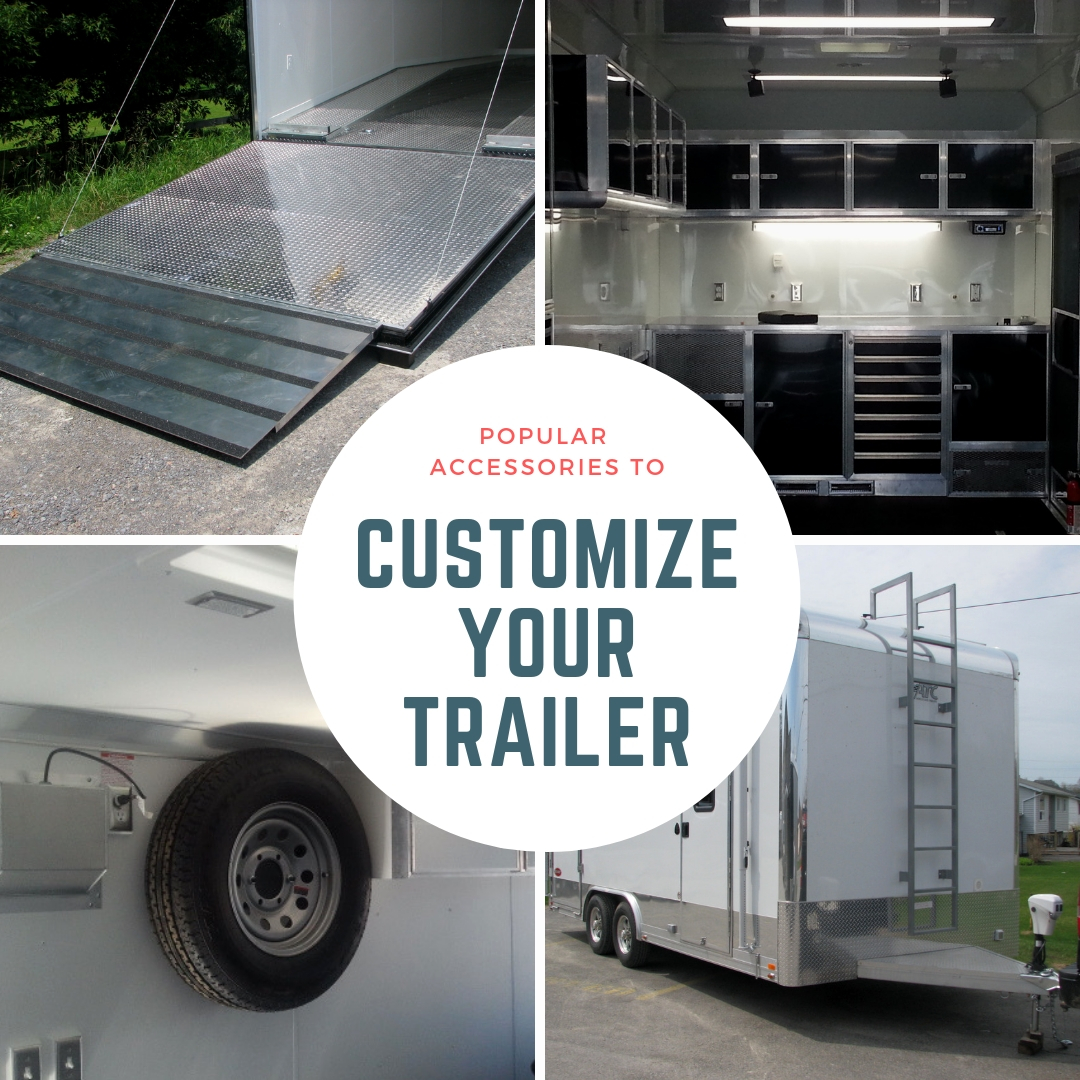
Cargo trailers come in many different styles and sizes, but even with the wide range of trailers available in the market today, customers may not find that perfect trailer that meets all their needs. The good news is any off-the-shelf stock trailer can be customized. Here’s our guide to choosing the best cargo trailer for you.
Once you have decided on the size of the trailer and the number of axles you want, everything else on a trailer are accessories and can be customized. Below is a list of the top 12 most popular accessories to customize your cargo trailer:
1. Doors
Side doors are standard features for most enclosed trailers. However, you have the option to add ramp or barn doors. Ramp doors are useful if your cargo can be driven onto the trailer (i.e. ATV or motorcycles). Barn doors on the back makes loading materials with a forklift much easier.
2. Nose
Cargo trailers typically have a flat or V-nose option. V nose trailers are more aerodynamic and reduce drag, making it a smoother tow. In addition, given that trailer lengths are measured from the outside rectangular portion, the space within the “V” area on the nose is considered extra space.
3. Air Conditioning
Air conditioning can be added to trailers, especially when your trailer will be used to haul cargo that is temperature sensitive or used to accommodate passengers while parked, i.e. a concession trailer.
4. Height Adjustment
The standard trailer height is 6 feet tall, but this can be increased or decreased according to your needs. For example, if you want to tow a side-by-side trailer, the height of the trailer will need to be increased since side-by-side ATVs are typically over 6 feet tall.
On the other hand, if your tow vehicle is a mid-size SUV or minivan, you may want to reduce the trailer height so your trailer is not taller than your tow vehicle. The most efficient height difference between the tow vehicle and trailer is within 18? – 24?. Anything taller will be like towing a parachute.
5. Windows
Adding windows to your trailer will allow natural light into an otherwise dark enclosed trailer.

6. E-track
If your trailer is primarily used to secure cargo, e-track can be added to tie down your freight to ensure it is secure.
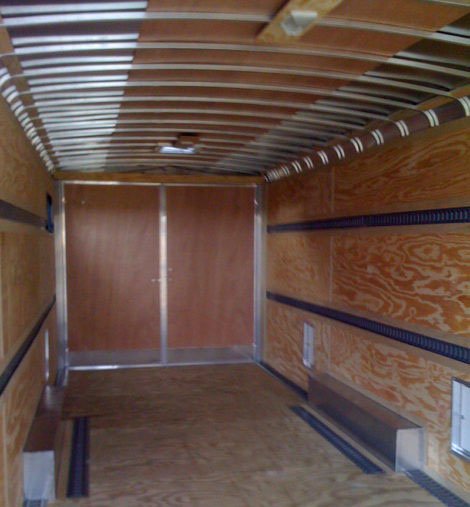
7. Spare Tires
It is always good to have spare tire with you for emergencies.
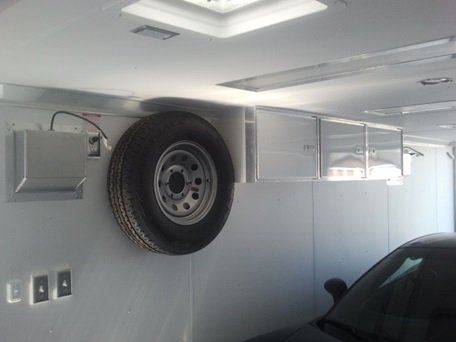
8. 12-volt Lighting and Power Supply
By installing 12-volt power, it allows you to use 12-volt electricity in your trailer without being connected to the towing vehicle.
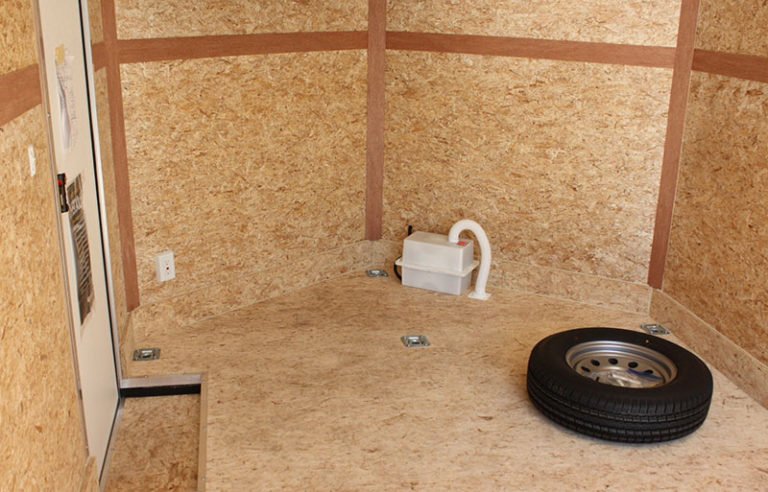
9. Electric outlets
We can add 120 volt AC electric outlets inside your trailer – great for powering up tools or appliances in your trailer.
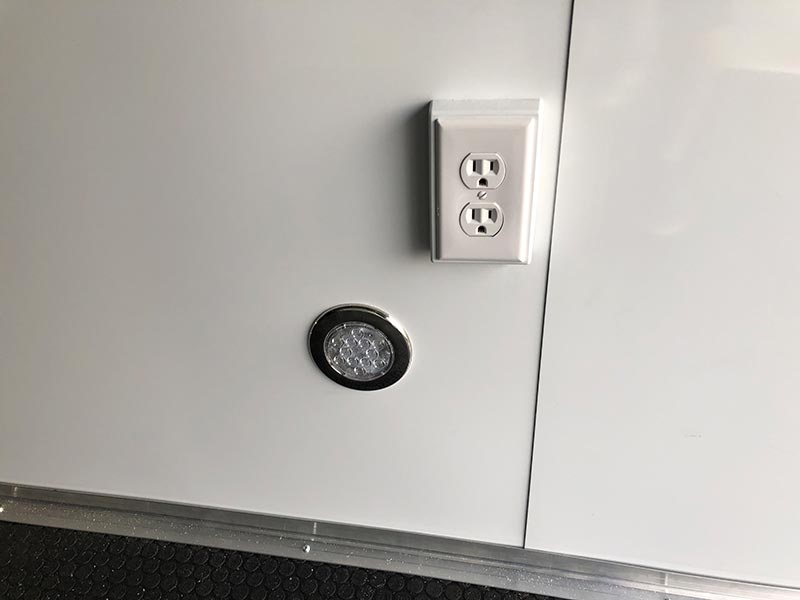
10. Electric tongue jacks
Electric tongue jacks are great add-ons for your trailer, to lift your trailer tongue with a simple flip of a switch.
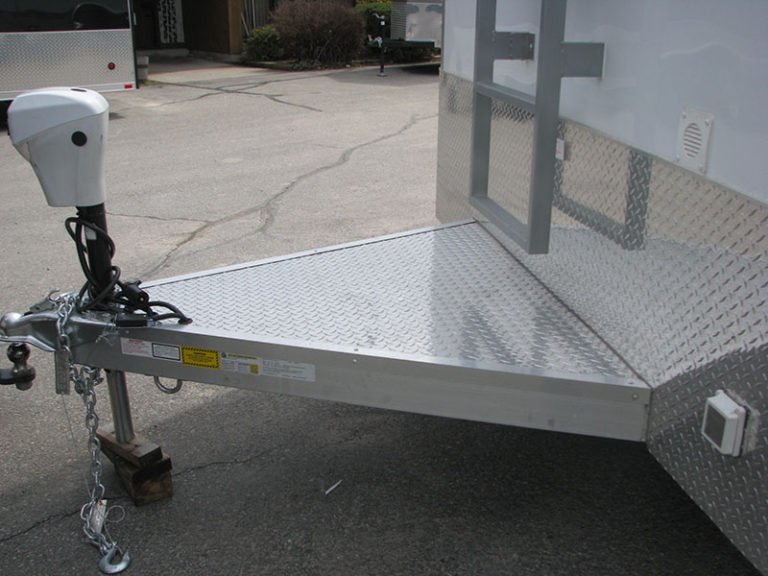
11. Cabinets
To help you organize your items inside your trailer, we can add cabinets inside your trailer, and the cabinets are fully-customizable to any configuration you choose.
12. Trailer flooring
There is a wide range of available flooring that can be installed for your cargo trailer, from rubber to vinyl to wood. You can also choose to have it painted.
If You Can Dream It, We Can Build It
If you have an idea of how you’d like to customize your trailer, contact us and our experienced staff can go through the various options available. We specialize in customizing trailers for sale across Ontario, including Ottawa, Kingston, Peterborough, Oshawa and Toronto.